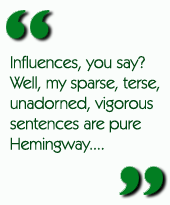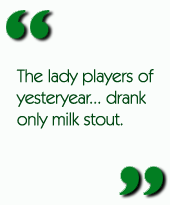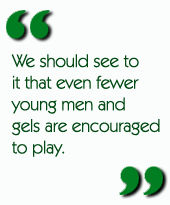

|
Back to |
| The Front Page |
| People |
|
A final interview with "Dolly Rush" |
|
by Peter Dorke Posted December 18, 2020
|
Mrs. Dorothy Rush was the doyenne of croquet writers. She had few equals but many imitators, not least the present writer, who interviewed her for 'Talking Croquet'. Dorothy Rush retired from competition 20 years ago and since then has played only in club 'friendlies'. For many years her stories, articles, and coaching tips were an indispensable feature of 'Croquet.' She finally laid down both mallet and pen a few years ago and now lives quietly with her thirty-five-year-old husband in Llanrhaeadr-ym-Mochnant in the heart of Wales. There, in the trophy-lined study of her tiny cottage, I asked her when she first played croquet.
| |||
Peter Dorke: So you believed you were making a serious and valuable contribution to the game?
DR: Of course I was. What on earth are you getting at? For example, the series of articles entitled "Winning with Rush" was instrumental in Chris Clarke's rise to the higher echelons of the game.
PD: He was a disciple of yours? I had no idea....
DR: No, you idiot, that's not what I meant, at all. Chris never read my articles but his opponents did and that was enough to destroy their games entirely.
PD: Yes, I see, how interesting. Is this something you cooked up between you?
DR: Are you mad? I've never met the fellow. I'd given up competition long before he came on the scene and once I'd hung up my old Solomon I kept very much in the background, except for selectors' meetings, of course.
PD: Why did you give it up? You must only have been about 40. Many people start to play at that age.
DR: Ah, well... couldn't cope with all the kids, don't you see? They changed the game entirely.
PD: In what way, exactly?
 DR: They won... and kept on winning. Blobbing hoops—my own special talent—was phased out of the game entirely. They would run a hoop, with control, from ten yards. Outrageous! I tried to get this made illegal, but to no avail. Then I tried to introduce an age limit, so that nobody under forty could play, but that chap Hudson put the mockers on that, too.
DR: They won... and kept on winning. Blobbing hoops—my own special talent—was phased out of the game entirely. They would run a hoop, with control, from ten yards. Outrageous! I tried to get this made illegal, but to no avail. Then I tried to introduce an age limit, so that nobody under forty could play, but that chap Hudson put the mockers on that, too.
PD: Really? He does seem to have been a bit of a nuisance.
DR: Nuisance? That's an understatement. He actually encouraged the young to play. Organized a Schools Championship. Even had the final at Hurlingham, one year.
PD: Ah.... yes.... I... er... remember that, now. You saw that as a retrograde step, then?

|
| Mrs. Rush, on a rare visit to the courts, talks our reporter through the unnecessary risks of the four ball break. |
At this point Mrs. Rush buried her face in her hands an began to sob quietly. I waited until the crisis passed and asked if she wanted to continue.
DR: Yes, yes, I must. It must be told. You see, this was not the end, or even the beginning of the end, nor even... well anyway, next came International Golf Croquet. You look shocked, young man, but surely you remember those dark days.
PD: I have tried to forget them, put them to the very back of my mind.....But do go on.
DR: And where did all this lead, you ask.
PD: I do? Well, actually....
DR: It led.... (here Mrs. Rush's voice became a harsh whisper) it led to the 14-point game.
PD: What, exactly, was your objection to that?
DR: Objection? My objection? Don't you see, you clown? All those changes were leading to shorter, faster games. Gone forever were the leisurely 4-hour marathons, with lunch and tea taken during the game. They even began playing best of five games. And finishing the whole match in a couple of hours!
 PD: Surely this points to a general raising of standards and a greater expertise at the top of the game.
PD: Surely this points to a general raising of standards and a greater expertise at the top of the game.
DR: What has expertise got to do with it? We're talking about a pastime. Let the damned snooker players display their damned expertise. Croquet is for the halt, the blind, and the lame.
PD: The blind?
DR: Haven't you ever played at.... (At this point she became so excited that her chair tipped over sideways, throwing her into the fireplace, and the name of the venue to which she referred was lost in the horrendous crashing of fire-irons. When Mrs. Rush recovered consciousness she was unwilling to confirm that she had intended to name any particular club.)
PD: I shall not keep you much longer, Mrs. Rush, but there is one question that the readers of ‘Talking Croquet' would like answered.
DR: Fire away, dear boy, fire away. I've nothing to hide.
PD: Well, it's just that.....um.....it has been suggested.....there was a rumour, as it were, that....er....you are in fact a.....man. Would you care to comment on.....?
Here the interview ended abruptly as Mrs. Rush seized her old Solomon mallet from its place of honour above the mantelpiece. I made an excuse and tried to leave, but was brought down by a vicious blow to the left shin. Notwithstanding the pain of my injury--in fact, not with standing at all--I managed to crawl out of the house and down the garden path. As Mrs. Rush whistled up her dogs I took shelter behind the blackthorn hedge.
So far this dramatic interview with Dorothy Rush had given rise to more questions than it had answered and I knew that croquet players from Colwyn Bay to Colchester would besiege the Editor of The Croquet Gazette with frantic requests for more information. I therefore attempted to continue to conduct the interview by loud hailer from the front gate of Mrs. Rush's picturesque cottage. I began by trying to find out which writers had most influenced her prose style.
DR: You just put one foot inside that gate and you'll get both barrels. I've told you already--I've given up croquet for good and I don't need to be reminded that I was once daft enough to waste time and typewriter ribbon on silly stories for that ridiculous magazine. Now sod off before I set the corgis on you.
PD: I see. All right, how do fifty quid and a bottle of Glenfiddich sound to you? After you've answered a few more questions of course.
DR: (after a very long silence) Influences, you say? Well, my sparse, terse, unadorned, vigorous sentences are pure Hemingway, of course. My unfortunately tendency to produce several thousand more words than an article merits emanates, probably, from my encounter, in later life, with the oeuvre of another croquet writer, S. Mulliner. You may have heard of him but it is unlikely you have ever read one of his articles all through.... Look, why don't you come up and we could open that Glenfiddich. You did say fifty pounds, didn't you? Goodness me, dear boy, that's a nasty limp you have. Nothing to do with my old Solomon, I hope.

PD: That's okay, Mrs. Rush.. The leg's probably broken but it was really my fault: I should have had the shot watched. Do you think you could ask your dogs to let go of my ankle.......Aaaargh!
DR: (dispersing the corgis with a vicious swipe of the shotgun) Sit yourself on that sofa and fire away while I'm pouring.
PD: (with a cautious eye on the old Solomon mallet above the fireplace) I am often asked whether you and I were ever involved more deeply than perhaps discretion would allow. May I ask you, now, to confirm for my readers that our relationship was entirely platonic?
DR: Young man, as far as I can recollect, we never even played doubles together, let alone whatever it is you are suggesting. Honi soit, Mr. Dorke, is all I have to say to that, honi soit!
PD: Horny......? Madam, if we are to conduct this interview civilly, I must ask you to cast no aspersions.
DR: Ah, you have seen my garden, then. Remind me to pick you some ravioli before you leave.
PD: You seen to have become disillusioned with writing. Was it the advent of the word-processor that put paid to you, finally?
DR: Absolutely not. Computers hold no fears for me. It was not so much ‘put paid to' as not paid at all. I suggested to that Hudson fellow that he should cough up a few pesetas occasionally for the gem of Eng. Lit. that poured from my old Brother, he just wasn't having any—and neither, apparently, was I.
PD: Your old brother? Are you admitting that the renowned Rush oeuvre was produced by your brother and not by you? This is sensational! The entire croquet world will be rocked. What is your brother's name?
DR: Whatever it is you're on I'd like a spliff or two, Mr. Dorke. A Brother, my dear idiot, was a Japanese typewriter, circa 1965. Gave me damn good service until I threw it at Goronwy in a fit of pique, after being beaten by Pat Asa Thomas in the Women's.
PD: Ah, yes, Goronwy. I expect you miss him.
Dorothy's only response to this question was a snort of derision and a sidelong glance at the large photo of her new husband in a leather posing pouch which stood on her desk.
PD: (Hurrying on) Mrs. Rush, why do you think there aren't more top women players?
DR: It's purely and simply a matter of strength.
 PD: Oh, surely on the fast lawns of the better clubs a woman is at no disadvantage.
PD: Oh, surely on the fast lawns of the better clubs a woman is at no disadvantage.
DR: Fast lawns have sweet Fanny Adams to do with it: I was referring to the strength of the feeble liquids taken post ludum by your average female player. If more women would follow the example of Gail Curry and allow only Guinness to lubricate their croquet playing, we would see many more of them at the top of the rankings. The lady players of yesteryear, the great champions of the Edwardian era, drank only milk stout. The image of croquet as a game dominated by tea and cucumber sandwiches is a total myth. The vicarage lawns of legend were awash with hard liquor and the fabled visits to the bushes had nothing to do with sexual frolics. Those hardy plants were the vomitoria of their time. You may find something similar at the Oxford University Croquet Club to this very day.
PD: You astound me. I hope - indeed, I confide - that the ladies game may now be enhanced by your advice. As croquet has so often in the past. We are humbled before your wisdom, Mrs. Rush. Look, may I call you Dorothy?
DR: No. Have you any more silly questions before I let the corgis back in?
PD: Perhaps a couple, if I may. There is a glaring shortage of good players in the under thirty range in Britain. How may be correct this?
 DR: My position is perfectly clear, as you might have gathered from my earlier remarks. We should not correct it. Indeed, we should see to it that even fewer young men and girls are encouraged to play. They should not be wasting their youth on such trivia. As I once heard dear Edgar say to a brash teenager. As the boy swaggered off lawn eight at Cheltenham after a well-controlled break, "I feel sorry for you, my boy: you've got the next fifty years to get worse." He thought one should take up the game at fifty and I tend to agree with that judgement. Anything else?
DR: My position is perfectly clear, as you might have gathered from my earlier remarks. We should not correct it. Indeed, we should see to it that even fewer young men and girls are encouraged to play. They should not be wasting their youth on such trivia. As I once heard dear Edgar say to a brash teenager. As the boy swaggered off lawn eight at Cheltenham after a well-controlled break, "I feel sorry for you, my boy: you've got the next fifty years to get worse." He thought one should take up the game at fifty and I tend to agree with that judgement. Anything else?
PD: Just one more question: Which was your favourite club and which your favourite lawn?
Again there was a long silence. Then Dorothy Rush began to speak, almost in a whisper.
DR: Ah, my Cheltenham and my Budleigh long ago! And what times we had at Southport. Such lovely people. The fun at Edgbaston at the end of long summer's day; Ken Jones pulling out hoops as he ran them; Alan Girling giving up croquet again as he missed the peg from three inches. What about the Counties at Southwick, playing with young Paul. What a gentleman! And the charm of Hunstanton. The food at Hurlingham. The friendliness of Glasgow, not to mention the cheap taxis. Those awful lawns at Dyffryn would take some beating…no, I don't think my favourite lawn was in Wales. Would I choose Nottingham? Fine people but the noise from the traffic! Now that was a joy to play at but a lot too far from the loos in my day. What can I say about Harrow.....Mr. Hilditch's Harrow? It's all too long ago. That was quite a tournament at Himley, when I won the Advance and.... Chris.... poor Ian.... a great time.... miss them all....
The whisper had become too faint to understand and Mrs. Rush's eyes had closed as though in sleep. A dampness glistened on her withered cheek. Not wishing to disturb her reverie, I got up quietly and left. Half way down the garden path the corgis attacked in force.
Peter Dorke invented and elaborated the persona of Mrs. Dorothy Rush for the English Croquet Gazette in many articles over decades of the last century. The articles lampoon the public image of the sport by turning on their heads public media perceptions as well as common assumptions of the croquet elite about the nature of the sport, and how it should be "improved." She was proudly alone in her insistence that young people should be discouraged from play, and that tightly set hoops should not ever be attempted from ten yards. She was right, however, in predicting that the game she called "Hoop Ball" would virtually take over the sport. That game is Golf Croquet, learnable in mere minutes, and it has become by far the most popular form of croquet played all around the world. So perhaps it's just as well that Dorothy Rush is no longer deploring the state of the game. As for Peter Dorke, our best information is that he is retired from teaching at Ludlow College and still lives in Schrewsbury.